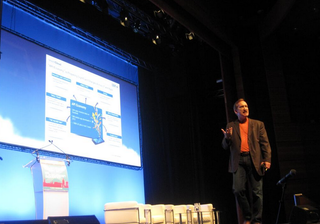
IBM acquired SoftLayer Technologies, Inc to leverage its cloud computing services. As this acquisition would impact my work as a cloud architect for good, I wanted to know how it would happen.
Until the acquisition, SoftLayer was considered the world's largest privately held cloud computing provider. The company has a very sophisticated data center operations team with the philosophy of automating everything as much as possible.
What really caught my attention in SoftLayer was one of its infrastructure as a service (IaaS) offerings called Bare Metal Cloud, which provides dedicated servers (bare metal machines provisioned in hours) as a cloud service. This offering is perfect for performance-intensive workloads and, in my opinion, it can be a game changer in the cloud computing war.
Two weeks after the announcement of the acquisition, I was working at an IBM facility in Research Triangle Park, NC and I had the opportunity to meet Mac Devine, the IBM Distinguished Engineer behind this important acquisition. Mac is also director, chief technology officer (CTO), cloud portfolio manager and an IBM Master InventorI wish to be like him in the future.
While watching Mac's presentation about SoftLayer, I had the idea of writing this post. I asked Mac if he would allow me to interview him and he accepted:
Q: What has SoftLayer been doing so well to get IBM's attention?
Mac: SoftLayer has been providing infrastructure as a service (IaaS) better than anybody else in the game. It provides a different x86 architecture with special services on Intel gear, flexibility and elasticity suitable to different types of workloads, which represent a significant advantage for IBM in the market. They have been providing a bare-metal offering that is perfect for online games, big data or any other Data IO intensive workload that requires end-to-end response latency performance.
Q: Do you think this acquisition will be a game changer in the cloud war against big players?
Mac: SoftLayer's dedicated bare metal offering and the ability to mix and match virtual and dedicated resources with single management represents an advantage against Rackspace and Amazon. SoftLayer's cloud infrastructure is 100 percent automated with SoftLayer's proprietary management system, which is also a considerable advantage. From a connectivity perspective, its three-tier network architecture provides customers the ability to build out and manage their own global infrastructure without overly complex configurations or significant costs. Meanwhile, the competitors have been providing services with slower response times at higher costs. All these advantages can be a game changer.
Q: I've seen some criticism about the acquisition saying that SoftLayer is not large enough to help IBM compete against cloud giants. What do you think?
Mac: SoftLayer provides the best IaaS on the planet. Its acquisition strengthens IBM midmarket cloud offerings. We've been seeing online gaming companies moving from Amazon to SoftLayer looking for response time guaranteed performance, mixing bare metal and virtual with the same elasticity and scaling to an enormous size. These customers are being able to do it all with SoftLayer and at the same cost. Furthermore, core SoftLayer people bring priceless knowledge to IBM. The combination of SoftLayer with IBM's pioneerism in the business is a perfect fit.
Q: Clouds from Amazon, Microsoft and Google are supported by a vast amount of guaranteed internal IT utilization along with a customer-first attitude that sees the providers using their own cloud infrastructure. Therefore, they have an internal desire to continuously lower the cost of provisioning and deploying IT resources as much as possible. How will IBM deal with it?
Mac: In fact, Microsoft and Google consume their own cloud infrastructure with their applications, but we provide the same capability with IBM integrated stack solutions and Smarter Planet offerings. Also, SoftLayer has a very optimized way of lowering the cost for customers. Its flexibility to mix and match x86 infrastructure (bare metal and virtualized) is the best fit to keep the services very competitive.
Q: IBM SmartCloud Enterprise+ and CloudLayer seem to be competing offerings. What will be the future of these offerings?
Mac: IBM SmartCloud Enterprise+ (SCE+) provides managed services. It means that SCE+ provides management above the hypervisor. SCE+ is part of IBM Global Technology Services and is different from SoftLayer's unmanaged services.
Q: What will be the future of the SoftLayer brand?
Mac: The SoftLayer brand will continue to exist due to its significant customer satisfaction and market acceptance in the Internet spacing.
Get the ITPro. daily newsletter
Receive our latest news, industry updates, featured resources and more. Sign up today to receive our FREE report on AI cyber crime & security - newly updated for 2024.
ITPro is a global business technology website providing the latest news, analysis, and business insight for IT decision-makers. Whether it's cyber security, cloud computing, IT infrastructure, or business strategy, we aim to equip leaders with the data they need to make informed IT investments.
For regular updates delivered to your inbox and social feeds, be sure to sign up to our daily newsletter and follow on us LinkedIn and Twitter.





